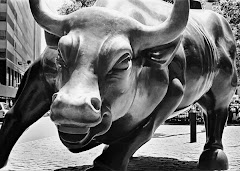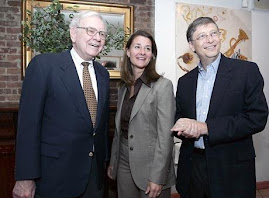There is a good article in Business Times last week. I had frequently shared my opinion on global economy, particularly US and China with personal friends. The common question that people usually asked are projection on US economy and strength of China’s economy.
Make no mistake. I’m not an economist although I studied economy during my previous study and read financial news (almost) daily. But I’m still not an economic consultant. However, with basic economic knowledge, commonsense and reading of analysts’ report, I’m able to draw reasonably accurate conclusion. My ACCA lecturer Mr Fred Keer used to say “commonsense is the least common human attributes”. He is an extraordinary lecturer. I think he is back to UK.
My projection for US economy remains the same. Besides sub-prime issue, which was recently removed from the centrestage, inflation and skyrocketed oil price may soon lead US into a recession. So it is very uncertain now and stock market should be avoided at all costs. As for the China market, even if we add in India’s market, both of them still cannot replace our export to US and Europe. Not to forget that China herself is also a net exporter to US. This means that she will also be hit should there be a downturn in US economy. If China is affected, certain their demand for Singapore product/services will drop. I think that’s pretty commonsense. Don’t need an MBA to understand this.
There is an article on Business Times that concurs with my analysis, or the other way round.
==============================
Growth in China, India can't offset US downturn
Advanced countries' weakness will hit growth in emerging markets: Fitch
By CONRAD TAN
(SINGAPORE) Emerging economies such as China and India are not big enough to offset a likely recession in the US and weakening growth in other advanced economies, the head of Asia-Pacific sovereign ratings at Fitch Ratings warned yesterday.
Since most developing economies are net exporters to the US and Europe, continued growth in emerging economies will not provide support for the developed economies that are still the dominant sources of world demand, said James McCormack, who is responsible for analysis and ratings of sovereigns in Asia.
While Fitch expects growth in emerging markets to continue to outpace that of developed economies, 'the fact that China and India are growing quickly doesn't mean the US is going to grow any faster', he said. 'It's not really going to help offset weakness in advanced economies. The trade flows suggest quite the opposite.'
Mr McCormack, who is usually based in Hong Kong, was speaking at a structured finance conference in Singapore organised by Fitch.
India accounted for just 2 per cent of global economic output last year as measured by gross domestic product at market exchange rates, according to the International Monetary Fund's April World Economic Outlook.
'And it's not a very open economy - imports are only 13 per cent of its GDP. So it doesn't really matter how fast India grows - it is not going to contribute to stronger growth in other markets,' said Mr McCormack. 'It doesn't import that much and it's just too small.'
China's contribution was six times larger, at 6 per cent of world GDP in 2007, he said. 'And it's a much more open economy as well.' Imports accounted for more than a quarter of China's GDP last year at market exchange rates, so faster growth in China should benefit those economies it imports from.
'But China is running very large trade surpluses with the US and the European Union. And that would suggest that China is a net supplier to those markets - it doesn't really demand very much from the US and the EU,' said Mr McCormack.
Collectively, the four so-called BRIC countries - Brazil, Russia, India and China - are running trade surpluses with the US and EU to the tune of more than US$500 billion, he said. 'What that tells us is that the trade flows are going from exports from the emerging markets to the advanced economies.
'So if there's weakness in the advanced economies, you're going to see weakness in the emerging markets. It's not the other way around, where you see strength in the emerging markets followed by strength in the advanced economies.'
If purchasing-power- parity exchange rates - the amount of currency needed to buy the same common basket of goods and services as one US dollar - are used rather than market exchange rates to measure GDP, China's share of world output in 2007 jumps to 10.8 per cent, while India's rises to 4.6 per cent.
But even by this revised measure, the 23 developing economies in Asia - excluding Japan, Hong Kong, Singapore and Taiwan - account for just 20.1 per cent of world output, less than the 21.4 per cent contributed by the US alone, according to the IMF report.
The UK and the 15 euro-area countries make up another 19.4 per cent of the world economy, while Japan accounts for 6.6 per cent of the total.
Make no mistake. I’m not an economist although I studied economy during my previous study and read financial news (almost) daily. But I’m still not an economic consultant. However, with basic economic knowledge, commonsense and reading of analysts’ report, I’m able to draw reasonably accurate conclusion. My ACCA lecturer Mr Fred Keer used to say “commonsense is the least common human attributes”. He is an extraordinary lecturer. I think he is back to UK.
My projection for US economy remains the same. Besides sub-prime issue, which was recently removed from the centrestage, inflation and skyrocketed oil price may soon lead US into a recession. So it is very uncertain now and stock market should be avoided at all costs. As for the China market, even if we add in India’s market, both of them still cannot replace our export to US and Europe. Not to forget that China herself is also a net exporter to US. This means that she will also be hit should there be a downturn in US economy. If China is affected, certain their demand for Singapore product/services will drop. I think that’s pretty commonsense. Don’t need an MBA to understand this.
There is an article on Business Times that concurs with my analysis, or the other way round.
==============================
Growth in China, India can't offset US downturn
Advanced countries' weakness will hit growth in emerging markets: Fitch
By CONRAD TAN
(SINGAPORE) Emerging economies such as China and India are not big enough to offset a likely recession in the US and weakening growth in other advanced economies, the head of Asia-Pacific sovereign ratings at Fitch Ratings warned yesterday.
Since most developing economies are net exporters to the US and Europe, continued growth in emerging economies will not provide support for the developed economies that are still the dominant sources of world demand, said James McCormack, who is responsible for analysis and ratings of sovereigns in Asia.
While Fitch expects growth in emerging markets to continue to outpace that of developed economies, 'the fact that China and India are growing quickly doesn't mean the US is going to grow any faster', he said. 'It's not really going to help offset weakness in advanced economies. The trade flows suggest quite the opposite.'
Mr McCormack, who is usually based in Hong Kong, was speaking at a structured finance conference in Singapore organised by Fitch.
India accounted for just 2 per cent of global economic output last year as measured by gross domestic product at market exchange rates, according to the International Monetary Fund's April World Economic Outlook.
'And it's not a very open economy - imports are only 13 per cent of its GDP. So it doesn't really matter how fast India grows - it is not going to contribute to stronger growth in other markets,' said Mr McCormack. 'It doesn't import that much and it's just too small.'
China's contribution was six times larger, at 6 per cent of world GDP in 2007, he said. 'And it's a much more open economy as well.' Imports accounted for more than a quarter of China's GDP last year at market exchange rates, so faster growth in China should benefit those economies it imports from.
'But China is running very large trade surpluses with the US and the European Union. And that would suggest that China is a net supplier to those markets - it doesn't really demand very much from the US and the EU,' said Mr McCormack.
Collectively, the four so-called BRIC countries - Brazil, Russia, India and China - are running trade surpluses with the US and EU to the tune of more than US$500 billion, he said. 'What that tells us is that the trade flows are going from exports from the emerging markets to the advanced economies.
'So if there's weakness in the advanced economies, you're going to see weakness in the emerging markets. It's not the other way around, where you see strength in the emerging markets followed by strength in the advanced economies.'
If purchasing-power- parity exchange rates - the amount of currency needed to buy the same common basket of goods and services as one US dollar - are used rather than market exchange rates to measure GDP, China's share of world output in 2007 jumps to 10.8 per cent, while India's rises to 4.6 per cent.
But even by this revised measure, the 23 developing economies in Asia - excluding Japan, Hong Kong, Singapore and Taiwan - account for just 20.1 per cent of world output, less than the 21.4 per cent contributed by the US alone, according to the IMF report.
The UK and the 15 euro-area countries make up another 19.4 per cent of the world economy, while Japan accounts for 6.6 per cent of the total.
.JPG)
.JPG)
.JPG)
.JPG)





